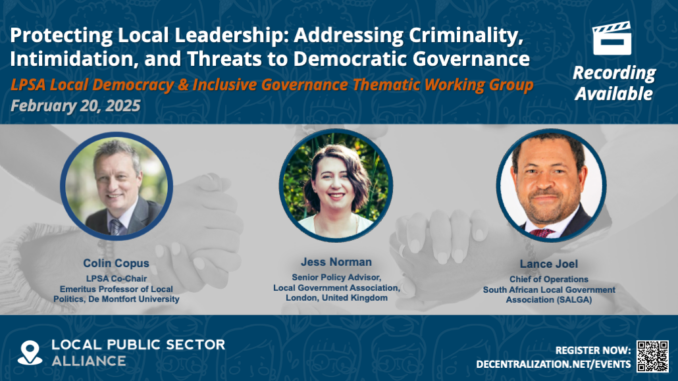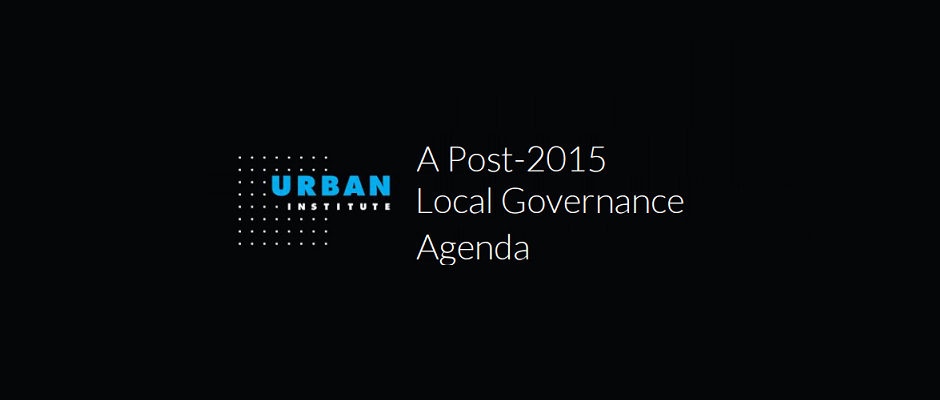
The discussion, hosted by LPSA’s Thematic Working Group on Local Democracy, Inclusive Governance, and Community-led Development, explored the rising threats faced by local elected officials, particularly intimidation, violence, and organized crime. Featuring insights from Jess Norman (UK) and Lance Joel (South Africa) and moderated by LPSA Co-chair Colin Copus, the session examined patterns of organized intimidation, the role of governance structures in ensuring security, and potential solutions for mitigating threats to local democracy.
Jess Norman, Senior Policy Advisor at the Local Government Association (LGA), discussed the increasing abuse and intimidation of local councillors in England. The Civility in Public Life program, launched in 2019, was prompted by incidents like the murders of MPs Jo Cox and Sir David Amess. While initiatives such as a model code of conduct and safety guidance were introduced, systemic challenges remained, including police inaction, insufficient data, and the normalization of abuse. The Debate, Not Hate campaign (2022) revealed that seven in ten councillors faced abuse, with a third feeling at risk. Much of this hostility stemmed from contentious issues like Brexit, climate policies, and council decisions. Although progress has been made through dedicated police contacts and enhanced council support, councillors—mostly women—face disproportionate levels of abuse, often discouraging them from leadership roles. The broader concern is that public tolerance of abuse against elected representatives is increasing, potentially eroding democratic participation.
Lance Joel, Chief of Operations of the South African Local Government Association (SALGA), outlined the escalating violence against municipal officials in South Africa. Over 300 councillors have been killed, with incidents of intimidation, property destruction, and violent protests becoming more frequent. Many of these attacks stem from public dissatisfaction with service delivery, where councillors, who live within the communities they serve, become accessible targets. Some protests escalate into violent acts, including arson and property destruction. While recent elections provided a democratic means for citizens to express grievances, violence persists when electoral outcomes fail to satisfy the public. SALGA’s studies in 2016 and 2018 showed increasing risks to local government officials, mirroring concerns in the UK. Smaller municipalities are especially vulnerable, as councillors often lack security protection, making local governance increasingly perilous.
A central question raised was about the perpetrators behind these threats and the extent of police accountability. John Coonrod inquired whether the violence was part of organized networks and whether local councils had control over police responses. Norman explained that UK councils do not directly control the police but participate in scrutiny through Police and Crime Commissioners. Threats range from individual grievances to well-organized protests, such as those against ultra-low emission zones (ULEZ), which sometimes receive backing from national or international groups. Joel described an even more structured and violent pattern in South Africa, where both protests and assassinations are coordinated. He highlighted that professional hitmen often carry out assassinations, making it difficult for law enforcement to identify and apprehend suspects. While municipal Metro police are accountable to councils, national police forces operate independently, leading to slow and ineffective responses when councillors report threats.
Charles Cadwell questioned whether local efforts were sufficient to address rising incivility. Joel argued that financial constraints make local responses inadequate, emphasizing the need for national leadership to protect councillors. Many remain in office despite facing severe threats because their livelihoods depend on their positions. Some are forced to live in hiding, and their families experience intimidation, adding to the risks of serving in public office. Norman elaborated on the democratic implications of such threats, noting that many councillors resort to self-censorship to avoid online abuse, misinformation campaigns, and even physical attacks. She stressed the urgent need for a national awareness campaign to educate the public on government roles, promote respectful political discourse, and secure external funding for councillor protection, as local councils lack sufficient resources.
Copus emphasized the severity of these threats, noting that even minor local issues can provoke serious violence. The problem is not limited to ideological disagreements but can arise from councillors performing routine duties, such as approving or rejecting planning applications. Joel elaborated on the range of perpetrators, which include internal party disputes, inter-party conflicts, and organized crime groups. He highlighted the influence of the “construction mafia,” which threatens councillors and municipal officials over lucrative building contracts. Certain regions in South Africa experience disproportionately high levels of violence, with targeted killings becoming a regular occurrence.
Both speakers welcomed international perspectives, recognizing that these challenges extend beyond the UK and South Africa. Joel warned that if left unchecked, the situation could lead to a governance crisis, where qualified individuals would be deterred from public office due to safety concerns, leaving local government vulnerable to criminal influence.
A video of the meeting is available on YouTube. The links below provide access to the video segments of the different agenda items.
| Agenda Item | Contributor |
| 1. Welcome and Introduction | Colin Copus Co-Chair LPSA Thematic Working Group on Local Democracy & Inclusive Governance, Emeritus Professor of Local Politics at De Montfort University, Visiting Professor at Ghent University |
| 2. Debate Not Hate | Jess Norman Senior Policy Adviser at the Local Government Association (LGA), UK |
| 3. Protecting Local Leadership: Addressing Criminality, Intimidation, and Threats to Democratic Governance | Lance Joel Chief of Operations at the South African Local Government Association (SALGA) |
| 4. Group Discussion & Moderated Q&A | Colin Copus Moderator |
| 5. Closing Remarks & Next Steps | Colin Copus Moderator |
The next Local Democracy, Inclusive Governance, and Community-led Development webinar is scheduled on May 8, 2025. Register Here.
Reminder: You can join any LPSA Expert Working Group free of cost and receive reminders and updates by opting-in to one or more working groups as part of your LPSA Membership registration.




